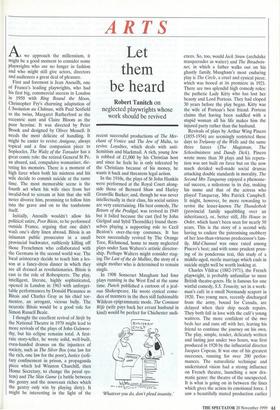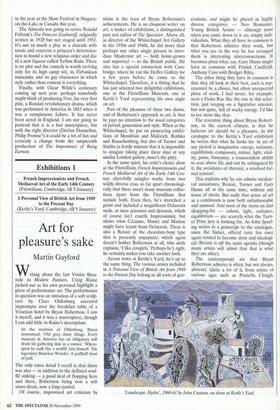ARTS
Let them be heard
Robert Tanitch on neglected playwrights whose work should be revived As we approach the millennium, it might be a good moment to consider some playwrights who are no longer in fashion and who might still give actors, directors and audiences a great deal of pleasure.
First and foremost is Jean Anouilh, one of France's leading playwrights, who had his first big, commercial success in London in 1950 with Ring Round the Moon, Christopher Fry's charming adaptation of L'Invitation au Chateau, with Paul Scofield as the twins, Margaret Rutherford as the eccentric aunt and Claire Bloom as the poor heroine. It was directed by Peter Brook and designed by Oliver Messell. It needs the most delicate of handling. It might be easier to revive Antigone, always topical and a fine companion piece to Sophocles. The Waltz of the Toreador has a great comic role: the retired General St Pe, an absurd, sad, compulsive womaniser, dic- tating his memoirs. There is a moment of high farce when both his mistress and his wife decide to commit suicide at the same time. The most memorable scene is the fourth act when his wife rises from her invalid-bed to scream at him that she will never divorce him, promising to follow him into the grave and on to the tombstone itself.
Initially, Anouilh wouldn't allow his political satire, Poor Bitois, to be performed outside France, arguing that one didn't wash one's dirty linen abroad. Bitois is an inhuman public prosecutor in a small provincial backwater, ruthlessly killing off those Frenchmen who collaborated with the Germans in the second world war. The local aristocracy decide to teach him a les- son at a fancy-dress dinner in which they are all dressed as revolutionaries. Bitois is cast in the role of Robespierre. The play, intelligent, literate, highly sophisticated, opened in London in 1963 with unforget- table performances by Donald Pleasance as Bitois and Charles Gray as his chief tor- mentor, an arrogant, vicious bully. The neurotic Bitois would be a good role for Simon Russell Beale.
I thought the excellent revival of Strife by the National Theatre in 1978 might lead to more revivals of the plays of John Galswor- thy, but his eclipse remains total. A first- rate story-teller, he wrote solid, well-built, even-handed dramas on the injustices of society, such as The Silver Box (one law for the rich, one law for the poor), Justice (soli- tary confinement in prison, a propaganda piece which led Winston Churchill, then Home Secretary, to change the penal sys- tem) and The Skin Game (a battle between the gentry and the nouveaux riches which the gentry only win by playing dirty). It might be interesting in the light of the recent successful productions of The Mer- chant of Venice and The Jew of Malta, to revive Loyalties, which deals with anti- Semitism and blackmail. A rich, young Jew is robbed of f1,000 by his Christian host and since he feels he is only tolerated by the Christians because of his money, he wants it back and threatens legal action.
In the 1910s, the plays of St John Hankin were performed at the Royal Court along- side those of Bernard Shaw and Harley Granville Barker; and, though he was never intellectually in their class, his social satires are very entertaining. His best comedy, The Return of the Prodigal, was revived in 1949 but it failed because the cast (led by John Gielgud and Sybil Thomdike) found them- selves playing a supporting role to Cecil Beaton's over-the-top costumes. It has been successfully revived by The Orange Tree, Richmond, home to many neglected plays under Sam Walters's artistic director- ship. Perhaps Walters might consider stag- ing The Last of the de Mullins, the story of a single mother who is determined to remain single.
In 1908 Somerset Maugham had four plays running in the West End at the same time. Punch published a cartoon of a jeal- ous Shakespeare. He wrote cynical come- dies of manners in the then still fashionable Wildean epigrammatic mode. The Constant Wife (wife pays back her errant husband in kind) would be perfect for Chichester audi-
'Whatever you do, don't plead insanity.'
ences. So, too, would Jack Straw (archduke masquerades as waiter) and The Breadwin- ner, in which a father walks out on his ghastly family. Maugham's most enduring play is The Circle, a cruel and cynical piece, which was booed at its premiere in 1921. There are two splendid high comedy roles: the pathetic Lady Kitty who has lost her beauty and Lord Porteus. They had eloped 30 years before the play began. Kitty was the wife of Porteus's best friend. Porteus claims that having been saddled with a stupid woman all his life makes him the injured party rather than the husband.
Revivals of plays by Arthur Wing Pinero (1855-1934) are seemingly restricted these days to Trelawny of the Wells and the same three farces (The Magistrate, The Schoolmistress and Dandy Dick). Pinero wrote more than 30 plays and his reputa- tion was not built on farce but on the now much derided well-made social dramas attacking double standards in morality. The Second Mrs Tanqueray enjoyed a phenome- nal success, a milestone in its day, making his name and that of the actress who played Tanqueray, Mrs Patrick Campbell. It might, however, be more rewarding to revive the lesser-known The Thunderbolt (provincial family squabbling over an inheritance), or, better still, His House in Order, which hasn't been seen for nearly 50 years. This is the story of a second wife having to endure the patronising snobbery of her less-than-virtuous predecessor's fam- ily. Mid-Channel was once rated among Pinero's best; and with some prudent prun- ing of its ponderous text, this study of a middle-aged, sterile marriage which ends in suicide might well be worth looking at.
Charles Vildrac (1882-1971), the French playwright, is probably unfamiliar to most British theatre-goers. He is famous for one wistful comedy, S.S. Tenacity, set in a work- man's café in a small Normandy seaport in 1920. Two young men, recently discharged from the army, bound for Canada, are delayed when their ship needs repairs. They both fall in love with the café's young waitress. The more confident of the two beds her and runs off with her, leaving his friend to continue the journey on his own. The play, simple, tender, delicately written and lasting just under two hours, was first produced in 1920 by the influential director Jacques Copeau. It was one of his greatest successes, running for over 200 perfor- mances. The naturalistic technique and understated vision had a strong influence on French theatre, launching a new dra- matic genre: the theatre of the unexpected. It is what is going on in between the lines which gives the action its emotional force. I saw a beautifully muted production earlier
in the year at the Shaw Festival in Niagara- on-the-Lake in Canada this year.
The Almeida was going to revive Ronald Firbank's The Princess Zoubaroff, originally written in 1920 but not staged until 1951. It's not so much a play as a charade with music and concerns a princess's determina- tion to found a new religious order and dis- til a new liqueur called Yellow Ruin. There is no plot and the comedy is worth reviving only for its high camp wit, its Firbankian innuendo, and its gay characters in which style rather than content is everything.
Finally, with Oscar Wilde's centenary coming up next year, perhaps somebody might think of producing Vera, his very first play, a Russian revolutionary drama, which was performed in America in 1883 when it was a conspicuous failure. It has never been acted in England. I am not going to pretend that it is a lost masterpiece, but with the right director (Declan Donnellan, Philip Prowse?) it could be a lot of fun and certainly a change from the umpteenth production of The Importance of Being Earnest.



























































































 Previous page
Previous page